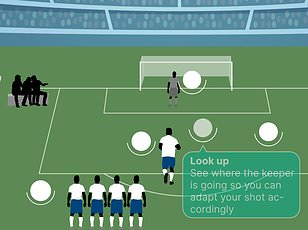From sweating palms to 'rocketing' hormone levels: Exactly what will happen inside football fans' bodies as they watch England take on Spain in the Euro 2024 final this weekend
- Sunday's final will involve a rollercoaster of emotions for fans as well as players
- READ MORE: Experts explore the science behind football fan behaviours
Is it finally coming home?
All will be decided on Sunday as Gareth Southgate's England take on Spain in the Euro 2024 final.
During the game, England fans will be subject to a rollercoaster of emotions and physical changes that they simply can't control.
Scientists at the University of Derby say fans can expect increased 'cognitive anxiety' that will lead to noticeable 'physiological symptoms' as they're watching.
From sweaty palms to a rapidly beating heart and a bloodstream pumping with hormones, here's what England vs. Spain will do to your body.

During the game, England fans will be subject to a rollercoaster of emotions and physical changes that they simply can't control. Pictured, fans in Manchester on Wednesday

Is it finally coming home? All will be decided on Sunday as Gareth Southgate 's England take on Spain in the Euro 2024 final
HEIGHTENED STRESS
During a stressful football match – or any stressful situation – the body releases the hormone cortisol from the adrenal glands, which are located on top of the kidneys.
This is part of what's known as the 'fight or flight' response – a physiological reaction where we innately prepare our bodies for a dangerous or frightening situation by releasing hormones.
One of the hormones released is cortisol, to help our bodies have the energy to respond to any such danger.
Cortisol increases energy and boosts alertness – but too much over time can result in a suppressed immune system, weight gain and heightened blood pressure with the risk of heart problems.
Prior research has found an increase in heart attacks among fans on important match days, due to dangerous levels of stress.

Whether you're at home watching on the big screen or in the stadium, fans put their body through a rollercoaster of responses during a crucial football match

During a stressful football match, the body releases the hormone cortisol from the adrenal glands, which are located on top of the kidneys
Devoted fans release more cortisol when watching live matches, according to a 2020 study published by experts at Oxford University.
INCREASED HEART RATE
A well-known 'fight-or-flight' hormone – adrenaline – surges during a stressful football match, ramping up how fast our heart beats.
There are specific sites on the cells of major organs, including the heart, called beta receptors, which respond to the adrenaline when it is released by increasing heart rate.
'This response isn’t to improve oxygen transfer but more a response to the hormones that are secreted,' said Mark Faghy, professor of clinical exercise science at the University of Derby.
Blood pressure also increases because the fight or flight hormones cause our blood vessels to constrict, although this is a temporary response.
'Our heart rate can increase when we get stressed or anxious, such as when we watch an important game of football,' said Dr Andy Hooton, sports and exercise scientist at the University of Derby.
'We hope that England can take an early lead in Sunday’s final, so that supporters can relax and enjoy the game without any sudden surprises or shocks.'

All will be decided on Sunday as Gareth Southgate 's England face Spain in the Euro 2024 final

Hugging helps to release oxytocin - the so-called 'cuddle' or 'bonding' hormone. Pictured, England fans in Croydon after their opening Euros goal against Ukraine, July 3, 2021
SWEATY PALMS
You may find your palms are sweaty – or at least sweatier than usual – during a really important football match.
That's due to eccrine sweat glands found in our hands, as well as forehead and feet which is controlled by the nervous system.
When the body's temperature rises – often as a result of fight or flight responses like higher heart rate – sweat is released to cool us down.
'We know that our hands and feet have a greater concentration of certain types of sweat glands compared to other areas of our body,' said Mel Lindley, head of the University of Derby's school of allied health and social care.
'These sweat glands are activated by the body’s stress hormones, so when we are stressed, our hands can get sweaty.'

Sweaty palms is a somatic response to the body's fight or flight response along with an increased in heart rate and breathing pattern

Physical changes happen in the body without having any control over them due to the 'fight or flight' response. Pictured, England fans watch the Euro 2020 match against Denmark, Trafalgar Square, London, July 7, 2021
ELEVATED BREATHING
All this extra work on behalf of our bodies means we need to breathe more deeply and at a faster rate, to get more oxygen from the air.
Breathing like this encourages full oxygen exchange – that is, the trade of incoming oxygen in the air for outgoing carbon dioxide.
Not surprisingly, it can slow the heartbeat and lower or stabilize blood pressure in response to stress – so remember on Sunday to stop to take a breath!
University of Derby experts advise deep breaths at 'poignant moments of the game' – so the immediate aftermath of England scoring or just before a penalty shoot-out.
HAPPY HORMONES
It's not all negative, however, as the body rewards us during footballing highs – like our team scoring a goal or winning the match.

Experts advise deep breaths at 'poignant moments of the game' - so the immediate aftermath of England scoring or just before a penalty shoot-out (pictured, Bukayo Saka of England during the shootout success against Switzerland on July 6)
Such euphoria triggers the release of bodies ‘happy’ hormones dopamine, oxytocin, adrenaline, endorphins and vasopressin.
'These natural chemicals can make us feel great and the positive impact is good for our health,' said Professor Faghy.
'We feel joy in our neurotransmitters, which are tiny chemical messenger cells that transmit signals between neurons and other body cells.
'This can boost our immune system, fight stress and pain and support longevity, so good luck Gareth and the team – the nation needs you to bring it home!'












































































































































































































































